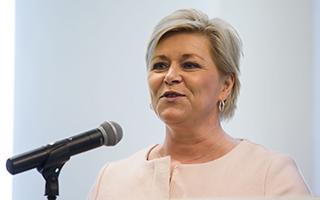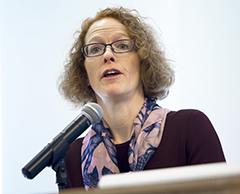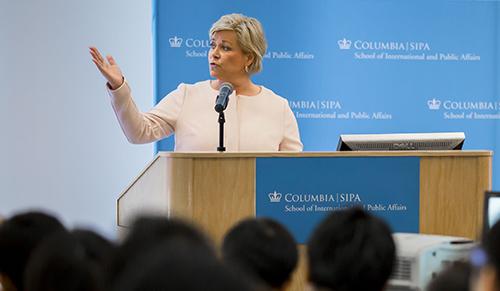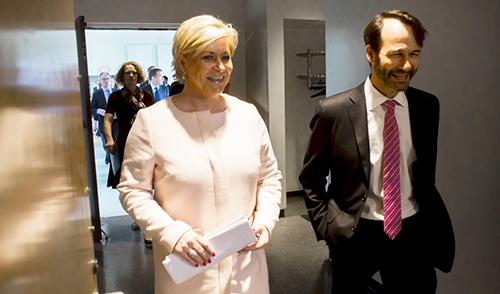Avoiding the Resource Curse
Siv Jensen, Norway's Minister of Finance, Visits Columbia To Discuss How Her Small Nordic Nation Manages the World's Largest Sovereign Wealth Fund
New York, April 27, 2015—Careful design and management of Norway’s sizeable sovereign wealth fund have helped the small nation avoid economic problems that often afflict other countries with abundant natural resources, said Norwegian Minister of Finance Siv Jensen in a well-attended talk at Columbia University April 15.
| Norwegian Minister of Finance Siv Jensen speaks at Columbia University April 15. |
After introductions from Gillian Lester, Dean and the Lucy G. Moses Professor of Law at Columbia Law School, and Lisa Sachs’08, director of the Columbia Center on Sustainable Investment (CCSI), Jensen discussed how the 1969 discovery of petroleum reserves in Norwegian territory helped transform an economy that had traditionally been based on fishing, mining, and agriculture into an oil-exporting powerhouse.
“When Columbia was founded in 1754, we were quite a poor country,” said Jensen, head of Norway’s Progress Party and a member of the Norwegian parliament. “Today we are in the Ivy League of economies, so to speak.”
| Dean Gillian Lester introduces Jensen. |
Jensen said resource-rich countries often face the “resource curse,” in which soaring revenues tempt leaders to abandon fiscal discipline, make dubious domestic investments in politically connected firms, and concentrate excessive resources in boom sectors that eventually slow down. Norway has avoided such problems, she said, by developing a sovereign wealth fund—the Government Pension Fund Global (GPFG)—which invests Norway’s oil revenues abroad. The GPFG is worth some $850 billion and withdrawal rules allow the country to only spend the real return on the principal. Designed for transparency, with clear lines of authority and responsibility, the fund pursues a robust investment strategy to insulate the economy from fluctuating oil prices, manage a gradual decline in production following an estimated peak in 2004, and achieve maximum long-term returns with a moderate level of risk.
“Capital can only be spent once, but by spending only the real return we lock in a rising standard of living moving forward,” Jensen said. “The government has some flexibility to spend more or less based on economic conditions, but overall must average out to the real return.”
| Jensen explains how Norway's sovereign wealth fund, the Government Pension Fund Global (GPFG), is organized to promote transparency and long-term growth. |
Jensen described how the GPFG is diversified among regions, countries, and sectors to weather short-term volatility and achieve a rate of annual return projected at 4 percent. The fund does not operate as a policy instrument to influence issues like climate change, she said, but does invest in line with Norway’s strong domestic standards to exclude human rights violators, institutions with deep corruption problems, and producers of tobacco and heavy weaponry. While primarily invested in equities and global fixed income, the fund has recently begun assembling a global real estate portfolio including properties in London, New York, Boston, and Washington, D.C.
Jensen credited Columbia University scholarship with helping the fund achieve better returns. Its value has increased sharply in recent years, reaching about 250 percent of Norway’s gross domestic product.
“Norway has established a robust and long-term fiscal framework that integrates oil revenues,” Jensen said, “So perhaps this will not be the last time a Norwegian Finance Minister speaks at Columbia!”
Following her presentation, Jensen took questions from the audience, moderated by Columbia Business School Professor Bruce Usher, the Elizabeth B. Strickler '86 and Mark Gallogly '86 Faculty Director of the Tamer Center for Social Enterprise. Jensen’s visit was co-hosted by CCSI, the Tamer Center, and the Center on Global Economic Governance at Columbia’s School of International and Public Affairs (SIPA).
Click here for video of Jensen’s appearance.
| Jensen shares a light-hearted moment with Columbia Business School Professor Bruce Usher, faculty director of the Tamer Center for Social Enterprise. |



